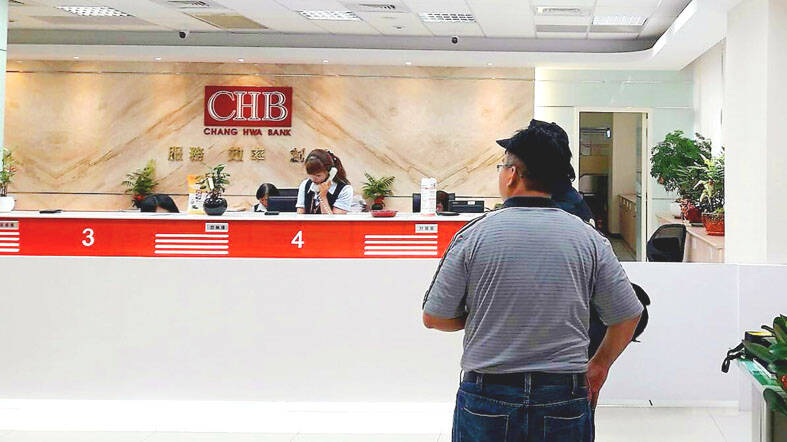Thanks to healthy loan growth and timely investment portfolio adjustments, state-run Chang Hwa Commercial Bank (CHB, 彰化銀行) yesterday said that earnings in the first 10 months of this year already surpassed its performance for the whole of last year.
The lender posted net income of NT$9.43 billion (US$302.15 million) from January to last month, or earnings per share of NT$0.89, company data showed.
“We will continue to increase US-denominated assets and boost lending in overseas markets while taking heed of credit risks,” CHB spokesman Chen Bin (陳斌) told an online investors’ conference.

Photo: CNA
CHB has benefited from interest rate hikes at home and abroad and was not burdened by COVID-19-related claims that have strained the finances of its peers that have non-life insurance affiliates.
Interest income in the first three quarters spiked 21.51 percent year-on-year and might pick up, as the US Federal Reserve is generally expected to continue raising its policy rates well into next year, Chen said, adding that Taiwan’s central bank would do the same, albeit at a milder pace.
Total loans expanded 7.84 percent, with lending to small and medium-sized enterprises rising 11.54 percent and overseas loans by 18.66 percent, Chen said.
Foreign-currency deposits rose 28.4 percent, as CHB took advantage of a strong US dollar, officials said.
The greenback has risen by double-digit percentage points this year against most other major currencies.
CHB said it has not let its guard down in the pursuit of profit growth, as evidenced by the decline in its bad loan ratio to 0.21 percent in the first nine months, from 0.33 percent during the same period last year. Its coverage ratio stood at 576.07 percent.
The bank said it is confident that its earnings momentum would be sustainable through the rest of the year.
However, the lender has not been spared from the deep corrections in global bond and equity markets, which drove its other comprehensive income into negative territory, with losses of NT$8 billion, and weakened its risk-based capital, officials said.
Things should improve this quarter, in line with a rebound in global financial markets, they said.
Despite the net worth erosion, CHB would still be able to distribute cash dividends next year as it has set aside sufficient provisions, officials said.
The bank would approach the matter cautiously and take cues from domestic financial institutes before making a decision next year, officials said.

COMPETITION: AMD, Intel and Qualcomm are unveiling new laptop and desktop parts in Las Vegas, arguing their technologies provide the best performance for AI workloads Advanced Micro Devices Inc (AMD), the second-biggest maker of computer processors, said its chips are to be used by Dell Technologies Inc for the first time in PCs sold to businesses. The chipmaker unveiled new processors it says would make AMD-based PCs the best at running artificial intelligence (AI) software. Dell has decided to use the chips in some of its computers aimed at business customers, AMD executives said at CES in Las Vegas on Monday. Dell’s embrace of AMD for corporate PCs — it already uses the chipmaker for consumer devices — is another blow for Intel Corp as the company

STIMULUS PLANS: An official said that China would increase funding from special treasury bonds and expand another program focused on key strategic sectors China is to sharply increase funding from ultra-long treasury bonds this year to spur business investment and consumer-boosting initiatives, a state planner official told a news conference yesterday, as Beijing cranks up fiscal stimulus to revitalize its faltering economy. Special treasury bonds would be used to fund large-scale equipment upgrades and consumer goods trade-ins, said Yuan Da (袁達), deputy secretary-general of the Chinese National Development and Reform Commission. “The size of ultra-long special government bond funds will be sharply increased this year to intensify and expand the implementation of the two new initiatives,” Yuan said. Under the program launched last year, consumers can

Citigroup Inc and Bank of America Corp said they are leaving a global climate-banking group, becoming the latest Wall Street lenders to exit the coalition in the past month. In a statement, Citigroup said while it remains committed to achieving net zero emissions, it is exiting the Net-Zero Banking Alliance (NZBA). Bank of America said separately on Tuesday that it is also leaving NZBA, adding that it would continue to work with clients on reducing greenhouse gas emissions. The banks’ departure from NZBA follows Goldman Sachs Group Inc and Wells Fargo & Co. The largest US financial institutions are under increasing pressure

FUTURE TECH: Nvidia CEO Jensen Huang would give the keynote speech at this year’s Consumer Electronics Show, which is also expected to highlight autonomous vehicles Gadgets, robots and vehicles imbued with artificial intelligence (AI) would once again vie for attention at the Consumer Electronics Show (CES) this week, as vendors behind the scenes would seek ways to deal with tariffs threatened by US president-elect Donald Trump. The annual Consumer Electronics Show opens formally in Las Vegas tomorrow, but preceding days are packed with product announcements. AI would be a major theme of the show, along with autonomous vehicles ranging from tractors and boats to lawn mowers and golf club trollies. “Everybody is going to be talking about AI,” Creative Strategies Inc analyst Carolina Milanesi said. “From fridges to ovens